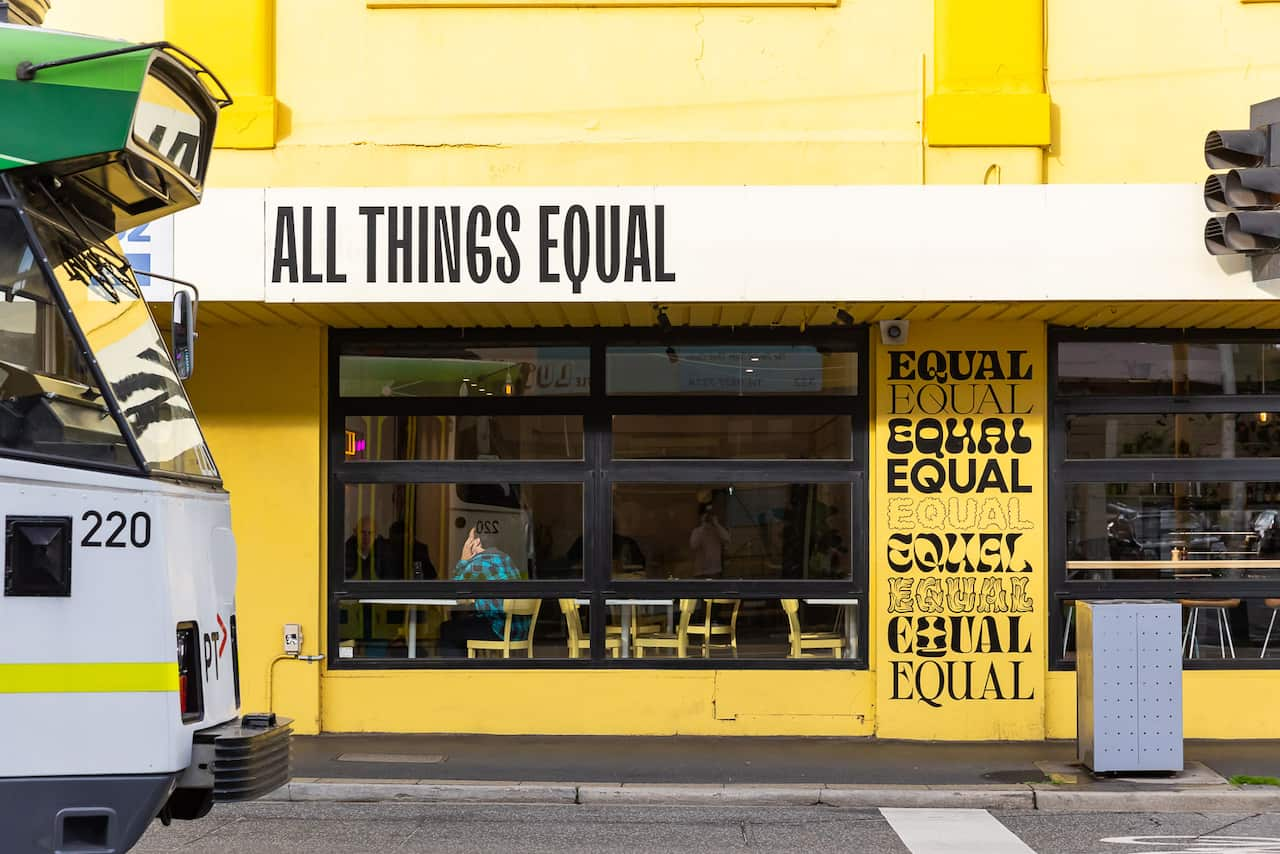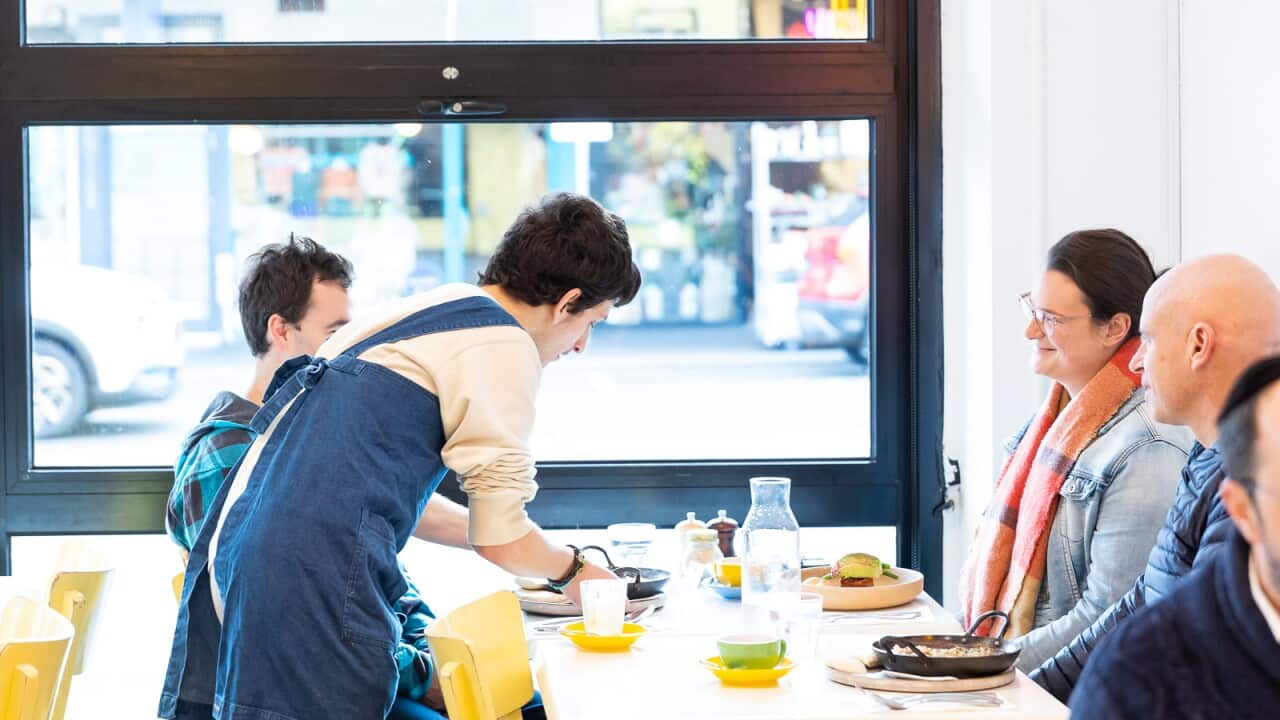Great food experiences happen when everyone is given a seat at the table.
Melbourne café All Things Equal Café is proof of that. All Things Café isn’t only an establishment that trains and employs people with disability. It is a warm and welcoming place that highly values its trainees, staff and customers, and serves superb food.
“I’ve been here since January, and I love working here. I love talking with customers…that’s my favourite thing to do,” Trainee Bridget Maycock said.
Speaking about her favourite dish amongst the café’s offerings, Bridget suggested, “I would recommend my favourite, the spanakopita. It’s tasty!”
The warm, friendly service from the staff enhanced my experience of the food – as I lapped up one of my all-time favourite brunch dishes, shakshuka, served with golden brown pita.

The comforting chunky tomato stew featured an almost-melted feta and fragrant Middle Eastern zhoug atop it. The eggs were poached perfectly, the yolks oozing out in the red stew slowly as they should – it was a meal worthy of any of the award-winning cafes regularly making Top-10 lists.
With a level of service that surpassed many other fancier restaurants, it was one of my most memorable dining experiences in a while.
Inclusivity means evolving
In the foreword for a report published by Melbourne-based All Things Equal Café, David West, Director of Human Resources at W Melbourne, wrote: “The workforce we already need are here. We just have to open the door.”
According to a report from All Things Equal, Equal Opportunity: A Blueprint for Disability Employment in Hospitality, Australian hospitality is in the midst of one of the biggest staff shortages in decades; however, hotels and food establishments continue to overlook people with disability simply because the system has yet to be adjusted to include them.
Representing a significant untapped personnel resource, people with disability face limited opportunities, despite being ready and willing to do meaningful work. It’s been found that people with disability are twice as likely to be underemployed as those without.
On the other hand, the hospitality sector is in dire need of workers as it deals with limited staff, high turnover, and costly recruitment. Despite representing 6.7 per cent of the workforce, Job Skills Australia projects that “21,400 additional hospitality workers will be needed by 2028, while the broader Community and Personal Service sector, which includes hospitality roles, will require an additional 146,000 workers by 2029 and 294,500 by 2034”.
The maths should be simple, right? One group seeks employment, and a vital sector needs people who want to work.
However, it isn’t much a matter of maths as it is about overcoming the barriers built by traditional business models, which revolve around profit and return-on-investment, rather than inclusion and flexibility.
A seat at the table
According to the report, barriers such as outdated employer attitudes, inflexible job structures that don’t accommodate diverse needs, and a misunderstanding of simple workplace adjustments prevent disability employment.
It isn’t to say that Australian employers aren’t open to hiring people with disability, but while 79 per cent of them have expressed interest, only 58 per cent of them actually do it, according to the 2024 DSS Disability Employment Reforms.
What the report found though, was that businesses in the hospitality sector that have evolved their business models to highlight inclusivity had higher staff retention, improved culture and morale, and enhanced customer experiences.
If the hospitality sector looked at employment differently, it will make a difference – not only in the survival of businesses, but in the lives of people they employ.

As All Things Café CEO Jess Colgan shares in the report, “As the sister of a proud deaf man, I’ve had the immense privilege to witness the world expand when the right structures and supports are put in place to unlock a person’s limitless potential. Their skills, talents, experience and unique perspective, light the world with colour and joy.”
Delicious food is, of course, one thing, but what makes All Things Equal Café a cut above the rest is its people – those who believe in the food they make, the staff who greet with warmth and expedite with efficiency and, the ones who find meaning in what they do.
Happily, they are not the only ones. Several other food establishments around Australia employ and train people with disability, including Chancez Cafes (VIC), dal Cafe & Catering (VIC), The DO Food Project Café (VIC), Anything But Humble (NSW), Civic Café (NSW), The Plant Room Café (NSW), Boronia Brew (QLD), Café Mojo (WA), The Cafe at Harry's Place (NT), and Hamlet Hobart Café (TAS).
Here’s hoping that number grows rapidly, where this no longer needs to be a separate list – but a normalised way of working for the hospitality industry.
SBS Food is a 24/7 foodie channel for all Australians, with a focus on simple, authentic and everyday food inspiration from cultures everywhere. NSW stream only. Read more about SBS Food
Have a story or comment? Contact Us

